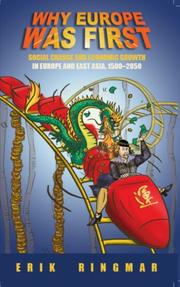| Listing 1 - 10 of 16 | << page >> |
Sort by
|

ISBN: 0521563143 0521026032 0511557701 Year: 1996 Volume: *4 Publisher: Cambridge Cambridge University press
Abstract | Keywords | Export | Availability | Bookmark
 Loading...
Loading...Choose an application
- Reference Manager
- EndNote
- RefWorks (Direct export to RefWorks)
http://www.loc.gov/catdir/toc/cam022/95051961.html
30-jarige oorlog, 1618-1648 --- Dertigjarige oorlog, 1618-1648 --- Guerre de Trente ans, 1618-1648 --- Thirty Years' War, 1618-1648 --- Nationalism --- -#SBIB:94H9 --- #SBIB:328H2155 --- Consciousness, National --- Identity, National --- National consciousness --- National identity --- International relations --- Patriotism --- Political science --- Autonomy and independence movements --- Internationalism --- Political messianism --- Counter-Reformation --- Geschiedenis van andere Europese landen --- Instellingen en beleid: Scandinavië --- Sweden --- History --- -Thirty Years' War, 1618-1648 --- -30-jarige oorlog, 1618-1648 --- -Nationalism --- #SBIB:94H9 --- Gustaf II Adolf, King of Sweden, 1594-1632 --- Sweden - History - Gustavus II Adolphus, 1611-1632. --- Social Sciences --- Sociology --- Thirty Years' War, 1618-1648.

ISBN: 9781843312413 1843312417 Year: 2007 Publisher: London Anthem
Abstract | Keywords | Export | Availability | Bookmark
 Loading...
Loading...Choose an application
- Reference Manager
- EndNote
- RefWorks (Direct export to RefWorks)
Industrial productivity --- Social change --- History. --- Europe --- East Asia --- Economic conditions. --- #SBIB:94H0 --- EUR / Europe - Europa --- CN / China - Chine --- JP / Japan - Japon --- 331.100 --- 338.8 --- Change, Social --- Cultural change --- Cultural transformation --- Societal change --- Socio-cultural change --- Social history --- Social evolution --- Productivity, Industrial --- TFP (Total factor productivity) --- Total factor productivity --- Industrial efficiency --- Production (Economic theory) --- Geschiedenis van Europa: algemeen --- Economische geschiedenis: algemeenheden. --- Economische groei. --- History --- Economische geschiedenis: algemeenheden --- Economische groei

ISBN: 1843311763 1843311755 9786613377715 1843317613 1283377713 9781843317616 9780857287236 0857287230 9781843311751 9781843311768 Year: 2005 Publisher: London Anthem Press
Abstract | Keywords | Export | Availability | Bookmark
 Loading...
Loading...Choose an application
- Reference Manager
- EndNote
- RefWorks (Direct export to RefWorks)
A fresh, funny and imaginative discourse on the nature of capitalism and how society has learned to cope with it.
Capitalism -- Social aspects. --- Globalization -- Economic aspects. --- Globalization -- Political aspects. --- Social change -- History. --- Social values. --- Business & Economics --- Economic Theory --- Capitalism --- Globalization --- Social change --- Social aspects. --- Economic aspects. --- Political aspects. --- History. --- Global cities --- Globalisation --- Internationalization --- Values --- International relations --- Anti-globalization movement --- Social values --- Social aspects --- Economic aspects --- Political aspects --- History --- E-books

ISBN: 0415342546 9780415342544 1280241322 9786610241323 0203338588 0415547709 9781134292646 1134292643 9780203338582 9781134292592 9781134292639 9780415547703 1134292635 Year: 2007 Publisher: London Routledge
Abstract | Keywords | Export | Availability | Bookmark
 Loading...
Loading...Choose an application
- Reference Manager
- EndNote
- RefWorks (Direct export to RefWorks)
Why, from the eighteenth century onwards, did some countries embark on a path of sustained economic growth, while others stagnated? This text looks at the kind of institutions that are required in order for change to take place, and Ringmar concludes that for sustained development to be possible, change must be institutionalized. Taking a global view, Ringmar investigates the implications of his conclusion on issues facing the developing world today.
338 <09> --- 338 <09> Economische geschiedenis --- Economische geschiedenis --- Entrepreneurship - East Asia - History. --- Entrepreneurship - Europe - History. --- Industrial productivity - East Asia - History. --- Industrial productivity - Europe - History. --- Social change - East Asia - History. --- Social change - Europe - History. --- Stagnation (Economics) - History. --- Entrepreneurship --- Industrial productivity --- Social change --- Stagnation (Economics) --- Economic stagnation --- Stationary state (Economics) --- Steady-state economics --- Economics --- Change, Social --- Cultural change --- Cultural transformation --- Societal change --- Socio-cultural change --- Social history --- Social evolution --- Productivity, Industrial --- TFP (Total factor productivity) --- Total factor productivity --- Industrial efficiency --- Production (Economic theory) --- Entrepreneur --- Intrapreneur --- Capitalism --- Business incubators --- History. --- History --- medieval --- society --- imperial --- china --- song --- dynasty --- dutch --- republic --- star --- demons
Book
ISBN: 9781783740246 9781783740253 1783740248 9781783740260 1783740264 9781783747788 1783747781 1783740256 9781783740239 9781783740222 1783740221 9781783740222 178374023X 9781783740239 Year: 2019 Publisher: Open Book Publishers
Abstract | Keywords | Export | Availability | Bookmark
 Loading...
Loading...Choose an application
- Reference Manager
- EndNote
- RefWorks (Direct export to RefWorks)
Existing textbooks on international relations treat history in a cursory fashion and perpetuate a Euro-centric perspective. This textbook pioneers a new approach by historicizing the material traditionally taught in International Relations courses, and by explicitly focusing on non-European cases, debates and issues. The volume is divided into three parts. The first part focuses on the international systems that traditionally existed in Europe, East Asia, pre-Columbian Central and South America, Africa and Polynesia. The second part discusses the ways in which these international systems were brought into contact with each other through the agency of Mongols in Central Asia, Arabs in the Mediterranean and the Indian Ocean, Indic and Sinic societies in South East Asia, and the Europeans through their travels and colonial expansion. The concluding section concerns contemporary issues: the processes of decolonization, neo-colonialism and globalization - and their consequences on contemporary society. History of International Relations provides a unique textbook for undergraduate and graduate students of international relations, and anybody interested in international relations theory, history, and contemporary politics. As with all Open Book publications, this en tire book is available to read for free on the publisher’s website. Printed and digital editions, together with supplementary digital material, can also be found at www.openbookpublishers.com.
International relations --- History. --- Diplomatic history --- International history (Diplomatic history) --- World history --- international relations --- non-European perspective --- International Relations courses --- East Asia --- pre-Columbian Central and South America --- Africa --- Polynesia --- Mongols in Central Asia --- Arabs in the Mediterranean --- the Indian Ocean --- Indic and Sinic societies in South East Asia --- the Europeans --- colonial expansion --- decolonization --- neo-colonialism --- globalization
Book
ISBN: 1009245651 1009245627 100924566X 1009245635 Year: 2023 Publisher: Cambridge, United Kingdom ; New York, NY : Cambridge University Press,
Abstract | Keywords | Export | Availability | Bookmark
 Loading...
Loading...Choose an application
- Reference Manager
- EndNote
- RefWorks (Direct export to RefWorks)
Increasingly we have come to live in our heads, leaving our bodies behind. The consequences have been far-reaching, of which cognitive theory has warned us, advocating a 'return to the body.' This book employs several case studies-kings performing in ballets, sea captains dancing with natives, nationalists engaged in gymnastics exercises-to demonstrate what has been lost and what could be gained by a more embodied approach to living, to history. These curious movements were ways to be, to think, to know, to imagine, and to will. They highlight the limits of historical explanations focusing on cultural factors and question currently fashionable 'cultural' and 'post-modern' perspectives. Bodies, cognitive theory tells us, are the same regardless of historical context, and they engage in the same intentional activities. Returning to our bodies and their movements enables us not only to explain historical actions anew, but also to understand ourselves better.
Movement, Psychology of. --- Psychophysiology. --- Mind and body. --- Body and mind --- Body and soul (Philosophy) --- Human body --- Mind --- Mind-body connection --- Mind-body relations --- Mind-cure --- Somatopsychics --- Brain --- Dualism --- Philosophical anthropology --- Holistic medicine --- Mental healing --- Parousia (Philosophy) --- Phrenology --- Psychophysiology --- Self --- Behavioral physiology --- Physiological psychology --- Physiopsychology --- Psychology, Physiological --- Physiology --- Psychobiology --- Mind and body --- Motor psychology --- Motion --- Motion study --- Movement education --- Muscular sense --- Psychological aspects
Multi
ISBN: 9781009245630 9781009245661 9781009245647 Year: 2023 Publisher: Cambridge Cambridge University Press
Abstract | Keywords | Export | Availability | Bookmark
 Loading...
Loading...Choose an application
- Reference Manager
- EndNote
- RefWorks (Direct export to RefWorks)
Book
ISBN: 1134292597 Year: 2005 Publisher: Taylor & Francis
Abstract | Keywords | Export | Availability | Bookmark
 Loading...
Loading...Choose an application
- Reference Manager
- EndNote
- RefWorks (Direct export to RefWorks)
Book
ISBN: 9781137031600 Year: 2013 Publisher: New York (N.Y.) Palgrave Macmillan
Abstract | Keywords | Export | Availability | Bookmark
 Loading...
Loading...Choose an application
- Reference Manager
- EndNote
- RefWorks (Direct export to RefWorks)

ISBN: 9780521026031 9780511557705 9780521563147 Year: 1996 Publisher: Cambridge Cambridge University Press
Abstract | Keywords | Export | Availability | Bookmark
 Loading...
Loading...Choose an application
- Reference Manager
- EndNote
- RefWorks (Direct export to RefWorks)
| Listing 1 - 10 of 16 | << page >> |
Sort by
|

 Search
Search Feedback
Feedback About UniCat
About UniCat  Help
Help News
News